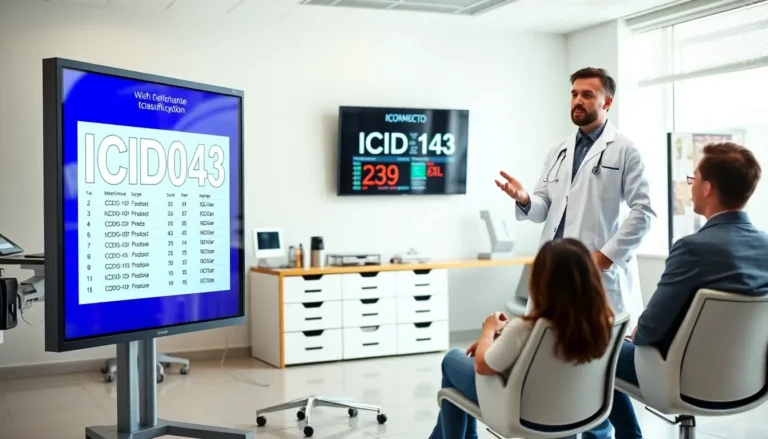Table of Contents
ToggleGetting a driver’s permit in Georgia is an exciting milestone, but it comes with its own set of challenges. The Georgia permit test assesses a candidate’s knowledge of road signs, traffic laws, and safe driving practices. For many, the key to passing this test lies in thorough preparation.
A well-structured study guide can make all the difference. It provides essential information and tips that streamline the learning process, helping candidates feel confident on test day. With the right resources, aspiring drivers can navigate the complexities of the permit test and set themselves up for success behind the wheel.
Overview of the Georgia Permit Test
The Georgia Permit Test assesses knowledge of road signs, traffic regulations, and safe driving practices. It consists of 40 multiple-choice questions, requiring candidates to answer at least 75% correctly to pass. Understanding the test format and content significantly enhances success chances.
Key areas tested include:
- Traffic Signs: Recognition and meaning of various road signs.
- Traffic Laws: Understanding state-specific rules regulating driving behavior.
- Safe Driving Practices: Knowledge of defensive driving techniques and safe maneuvering.
The Georgia Department of Driver Services (DDS) provides study materials, including a driver’s manual and online resources. Candidates should utilize these tools to prepare thoroughly, addressing any weak areas before test day. Practice tests also offer insight into the actual test experience, helping build confidence and familiarity.
Key Topics Covered in the Study Guide

The study guide for the Georgia permit test focuses on essential topics, ensuring that candidates are well-prepared. Key areas include understanding road signs, traffic laws, and safe driving practices.
Road Signs and Their Meanings
Road signs represent visual cues on the roadway. Candidates must identify various types of signs, including regulatory, warning, and informational signs. Examples of regulatory signs include stop, yield, and speed limit signs, which dictate driver behavior. Warning signs, such as those indicating sharp turns or pedestrian crossings, help drivers anticipate hazards. Informational signs provide guidance, including directions and distances to landmarks. Familiarity with these signs is crucial for safe navigation and compliance with traffic laws.
Traffic Laws and Regulations
Traffic laws govern vehicle operations and ensure safety. Candidates should study key regulations such as right-of-way rules, speed limits, and DUI laws. Specific laws in Georgia dictate vehicle registration, insurance requirements, and penalties for violations. Understanding the consequences of infractions, such as points on a driving record or fines, emphasizes the importance of adherence to these laws. Familiarity with state-specific laws prepares candidates for questions on the permit test.
Safe Driving Practices
Safe driving practices form the foundation of responsible vehicle operation. Candidates must learn techniques for defensive driving, which include maintaining safe following distances and using mirrors effectively. Understanding the consequences of distractions, such as mobile phone use, is critical for avoiding accidents. Candidates should also be aware of the importance of seatbelt use and child passenger safety laws. These practices significantly reduce the risk of collisions and enhance the safety of all road users.
Preparing for the Georgia Permit Test
Effective preparation for the Georgia Permit Test increases test readiness and boosts confidence. Candidates should employ strategic study techniques and utilize recommended resources for optimal results.
Study Strategies and Tips
- Create a Study Schedule: Developing a structured timetable ensures consistent study sessions over several weeks, promoting thorough retention of information.
- Focus on Key Topics: Concentrate on understanding road signs, traffic laws, and safe driving practices, as these areas constitute a significant portion of the test.
- Utilize Practice Tests: Taking practice tests reinforces knowledge and identifies weak areas. Candidates can simulate the test environment, which helps reduce anxiety on test day.
- Learn from Mistakes: After completing practice tests, review incorrect answers to understand misconceptions and enhance comprehension of the material.
- Stay Engaged: Incorporate various study methods, such as flashcards, videos, or discussion groups, to maintain motivation and interest in the material.
Recommended Resources
- Georgia Driver’s Manual: The official manual covers all essential topics tested, providing a comprehensive overview of state laws and driving practices.
- Online Practice Tests: Numerous websites offer free practice tests that mimic the multiple-choice format of the actual exam, helping candidates acclimatize to test conditions.
- Apps for Study: Mobile applications designed specifically for Georgia’s permit test can offer quizzes and interactive content, allowing flexible learning on-the-go.
- DDS Resources: The Georgia Department of Driver Services provides additional materials and guidelines that can clarify requirements and expectations for the permit test.
Taking the Georgia Permit Test
The Georgia Permit Test is a crucial step in the process of obtaining a driver’s permit. Understanding what to expect and how results are determined enhances candidates’ overall preparedness.
What to Expect on Test Day
Candidates should arrive at their designated testing location with proper identification and any required documents. The test comprises 40 multiple-choice questions, with topics focusing on road signs, traffic laws, and safe driving practices. Test-takers receive 40 minutes to complete the exam. During the test, candidates should remain calm and carefully read each question before selecting an answer. The Georgia Department of Driver Services (DDS) operates the testing facilities, ensuring consistency in the testing environment.
Scoring and Results
To pass the Georgia Permit Test, candidates must score at least 75%, answering 30 out of 40 questions correctly. Immediately after completing the test, candidates receive their results. If a candidate passes, they can move forward with obtaining their learner’s permit. In case of failure, candidates may retake the test after a waiting period of one day. Recording test performances helps candidates focus on areas needing improvement for future attempts.
Preparing for the Georgia Permit Test is essential for success. A structured study approach combined with the right resources can make a significant difference in a candidate’s confidence and performance. Utilizing the Georgia Driver’s Manual and online practice tests will help reinforce knowledge and address any weak areas.
On test day, staying calm and focused is crucial. Understanding the test format and requirements will further enhance readiness. With diligent preparation and a clear understanding of key topics, candidates can navigate the permit test with ease and move one step closer to becoming safe and responsible drivers.







